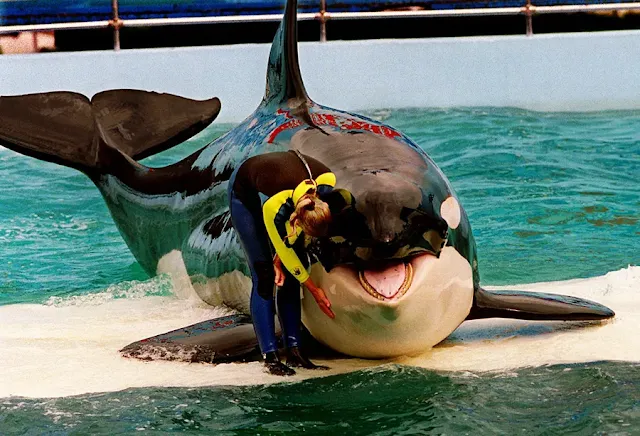The elderly killer whale may soon make its way back to the seas off the
Pacific Northwest coast, where Lolita's mother supposedly still
resides.
Lolita the killer whale may return to the ocean and maybe reunite with her
elderly mother 52 years after being brought into captivity.
According to The Guardian, activists are making progress in their
decades-long effort to free Lolita, also known as Tokitae or Toki, who was
taken from the wild and brought to the Miami Seaquarium in 1970.
According to the publication, the 56-year-old orca has been living and
performing in what has been called the tiniest tank in North America for
captive killer whales since 1970.
Lolita's health has fluctuated throughout the years. Despite having
outlived her tankmate Hugo, specialists have said the elderly whale is in
"remarkably good form," according to the newspaper. After continuously
banging his head against his enclosure, he passed away in 1980 as the result
of a cerebral aneurysm.
Howard Garrett, a whale researcher and Orca Network campaigner who has
fought for Lolita's release since 1995, told The Guardian that she "is a
miracle every day." "She is still alive, which is against all chances. Her
mental health, in my opinion, is what maintains her physical health.
"She's not withdrawn, neurotic, or exhibiting any stereotypical behavior
that would point to any type of brain damage brought on by being held
captive," he added. She could be an absolute exception in terms of
maintaining her health.
She was fed less than was advised and wasn't drinking enough water,
according to a USDA investigation that faulted the Miami Seaquarium's
treatment of the animal last year.
According to the report, the attending veterinarian was also concerned that
Toki wasn't getting enough water (because marine animals absorb water from
fish for their hydration needs) and that the lack of meal volume would make
her uncomfortable and agitated.
Officials in Norway killed Freya the Walrus due to concerns about public
safety.
"The AV also had problems with the Training Curator mandating the inclusion
of rapid swims and huge jumps throughout training sessions and shows for
this elderly whale," the statement stated. The AV was concerned that Toki's
irregular bloodwork may lead to over-exertion and winding, which was in fact
noticed by both the senior trainer and the AV. The AV determined that Toki
had likely struck her lower jaw at the bottom flume or bulkhead while brisk
swimming. According to Toki's medical records, she had lower mandibular
injuries on February 25, March 10, April 6, and April 7, 2021.
According to The Guardian, campaigners are optimistic about Lolita's
ultimate release to free seas as a result of the report's conclusions and
the fact that the facility's new owners are amenable to the possibility of
releasing the whale.
Never miss a story again by subscribing to PEOPLE's free daily email and
staying up to speed on all the publication has to offer.
Lolita may soon be reunited with her mother, a 93-year-old whale known as
L25 or "Ocean Sun," even though restoring her to her former environment
entails hazards, according to Newsweek.
According to Newsweek, the senior animal still apparently roams the Salish
Sea's waters close to Puget Sound in the Pacific Northwest, in charge of a
pod of southern resident killer whales.
Tags:
animals

